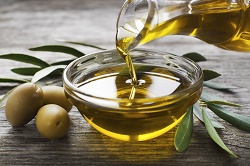A cheap and simple test to verify olive oil-related health claims
The fact that olive oil polyphenols contribute to the protection of blood lipids from oxidative stress - a physiological stress in the body that can cause DNA mutations and lead to diseases such as cancer, heart and blood disorders, diabetes and neurodegenerative disorders - is well documented. European regulation tells us that these benefits only become tangible starting with a 20 g olive oil intake every day, and that they can be claimed only for when this daily intake contains at least 5 mg of hydroxytyrosol and its derivatives. But verifying compliance with this requirement is not as easy it could seem. ‘There are sophisticated chromatographic techniques, such as the high-performance liquid chromatography (HPLC) coupled to ultraviolet-visible or mass spectrometry detector that are used to evaluate the phenolic content of virgin olive oils,’ Giuseppe Di Lecce from the University of Bologna explains. ‘However, these systems require very expensive analytical tools and qualified technicians.’ Together with a group of researchers from the Universities of Bologna and Vigo, Di Lecce devised a simple analytical method to quantify the phenolic content of extra virgin olive oils. The results of their preliminary study, which was funded under the OLEUM project, are promising. ‘The results show that the simple and cheap colorimetric assay based on the use of the Folin-Ciocalteu (FC) reagent can be also efficiently applied to verify the compliance to the polyphenols health claim introduced by the EU Regulation,’ Lecce underlines. The FC method is a well-known colorimetric assay that can be executed in any laboratory, and tests carried out by statistical software and focussing on hydroxytyrosol found its data to be fully comparable with those obtained, after hydrolysis, with the HPLC-UV method using hydroxytyrosol and tyrosol. The next step for the team will consist in analysing a large number of samples to draw final conclusions. Still, these early results raise hope that small labs and producers will soon benefit from rapid and innovative instrumental approaches to evaluate the quality and authenticity of olive oils. OLEUM Is a EUR 5 million worth project funded under Horizon 2020. Its overall objective is to assure the quality and authenticity of olive oils at a global scale. Further breakthroughs, including the setup of a reliable protocol for the determination of phenolic compounds in virgin olive oils according to the EU health claim, are expected before its completion in 2020. For more information please see: CORDIS project page
Countries
Italy



